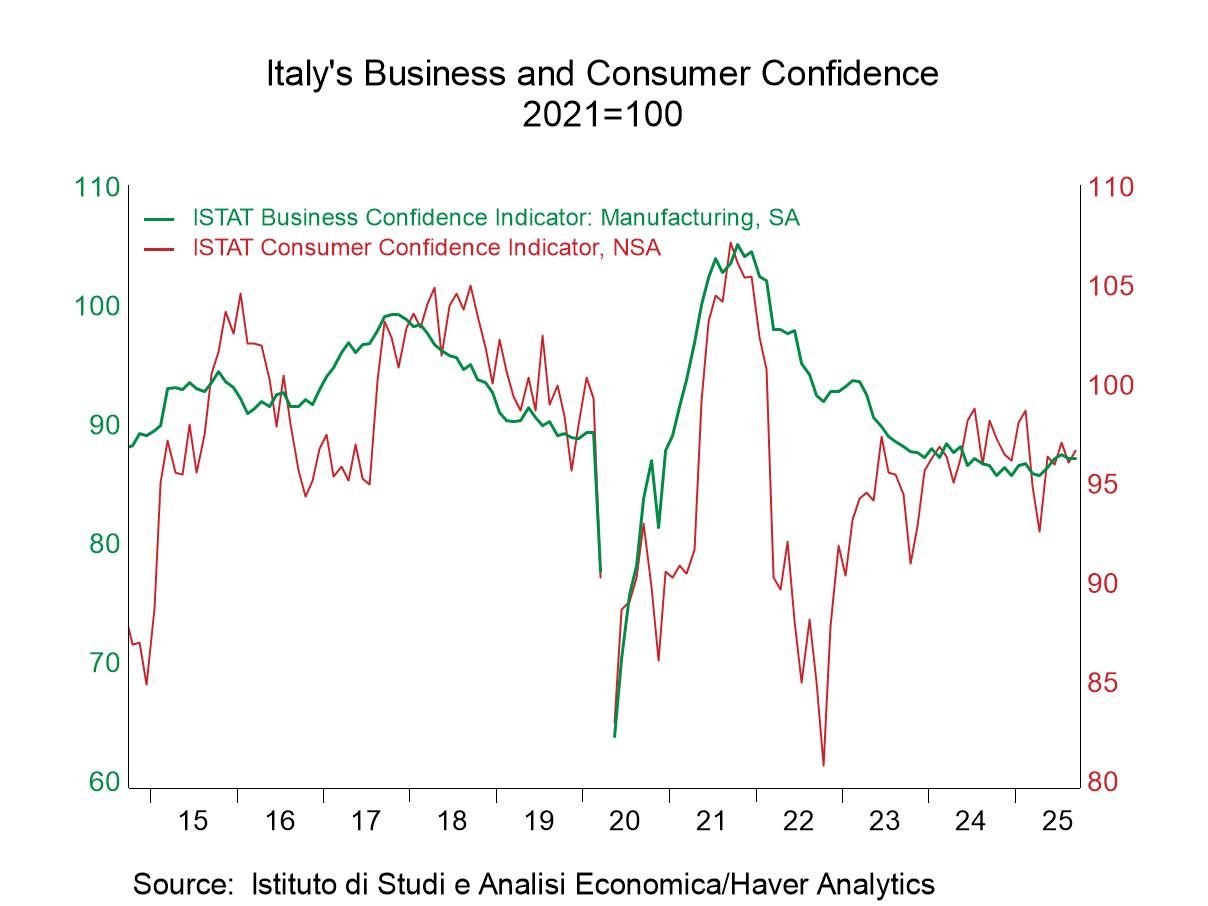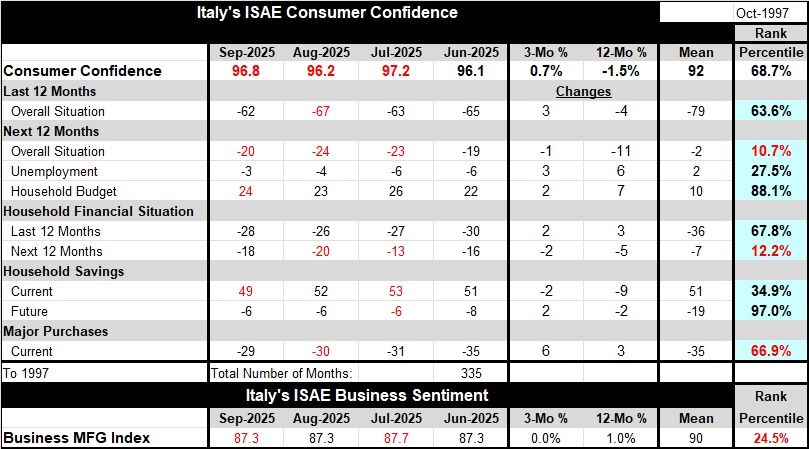Italy’s Confidence Creeps Higher

The chart shows that within the big picture Italian confidence both business and consumer confidence has been relatively steady in recent months for about a year. The consumer reading has had some volatility but no trend. Technically in the current month business confidence is unchanged, and consumer confidence has moved up a couple of tenths of a point on the index of consumer confidence. The index is higher by 0.7% over three months and lower by 1.5% over 12 months. When ranked on data back to late-1997, the current index ranks in a 68.7 percentile of its queue of data, placing it in the top one-third of confidence values over that period. It’s a reasonably firm reading and a high reading by most standards among European countries at this time.
Assessments of the overall situation over the last 12 months improved to net survey reading of -62 in September from -67 in August. That reading has a 63.6 percentile standing.
Assessing the overall situation for the next 12 months ahead, there's another improvement to -20 in September from -24 in August; however, this is a much weaker reading, residing in a 10.7 percentile of its historic queue of data. So, while the overall situation has been relatively firm and the overall confidence reading is firm, the outlook for the next 12 months has some ominous undercurrents to it. Unemployment expectations have increased slightly to a -3 reading from -4. That index in September has a 27.5 percentile standing, a relatively low standing overall but still a little high to be really comfortable from a consumer confidence standpoint. Household budget assessments improved slightly to +24 from +23, which has a very strong standing in its 88th percentile.
The household financial situation, looking ahead, improves slightly; over the last 12 months it deteriorated slightly. The backward-looking measure has a 67.8 percentile standard while the forward-looking measure has a 12.2 percentile standard, once again, raising those concerns about what the future is going to hold.
The current assessment for household savings slipped slightly to a reading of 49 in September from 52 in August; the future reading is steady at -6 in September. The current reading has a 34.9 percentile standing; the future reading has the 97-percentile standing. This higher reading for the future is not necessarily good news as responses to savings are typically correlated negatively with responses about intentions to spend and are often associated with concerns about the future. However, the direct question about the environment for making major purchases showed a slight improvement to -29 in September from -30 in August and produced a standing in a 66.9 percentile, a top one third reading. For now, the consumer in Italy is still undaunted and holds relatively firm view of the environment for spending. The business environment assessment was unchanged month-to-month but overall has a much weaker standing.
The businesses assessment is only in the 24.5 percentile of its historic queue of data marking the responses as a bottom 25 percentile response which is not reassuring.

Summing up On balance, Italy’s consumer confidence survey is a relatively firm report and encouraging; however, it clearly has a few dark elements in it to be watched as there are concerns about the future overall situation and concerns about the coming household situation as well as a 25-percentile standing of concern for the outlook for inflation on top of that businesses more ominous than consumers rate the prospects as much. The assessment by the ISAE survey for now is a reasonably positive assessment but one with some clear markers to be watched in the future.
Robert Brusca
AuthorMore in Author Profile »Robert A. Brusca is Chief Economist of Fact and Opinion Economics, a consulting firm he founded in Manhattan. He has been an economist on Wall Street for over 25 years. He has visited central banking and large institutional clients in over 30 countries in his career as an economist. Mr. Brusca was a Divisional Research Chief at the Federal Reserve Bank of NY (Chief of the International Financial markets Division), a Fed Watcher at Irving Trust and Chief Economist at Nikko Securities International. He is widely quoted and appears in various media. Mr. Brusca holds an MA and Ph.D. in economics from Michigan State University and a BA in Economics from the University of Michigan. His research pursues his strong interests in non aligned policy economics as well as international economics. FAO Economics’ research targets investors to assist them in making better investment decisions in stocks, bonds and in a variety of international assets. The company does not manage money and has no conflicts in giving economic advice.
More Economy in Brief
 Global| Feb 05 2026
Global| Feb 05 2026Charts of the Week: Balanced Policy, Resilient Data and AI Narratives
by:Andrew Cates






